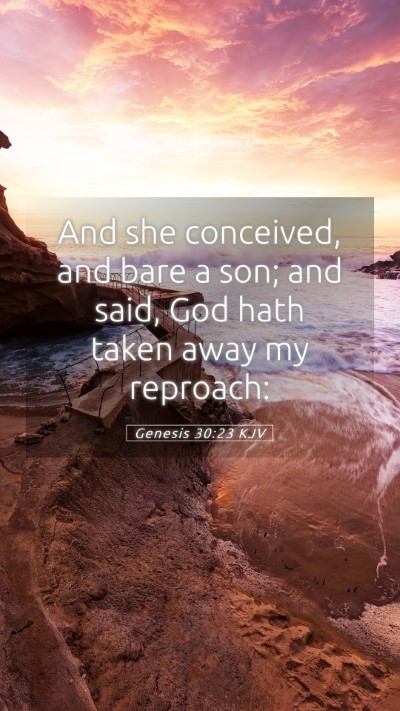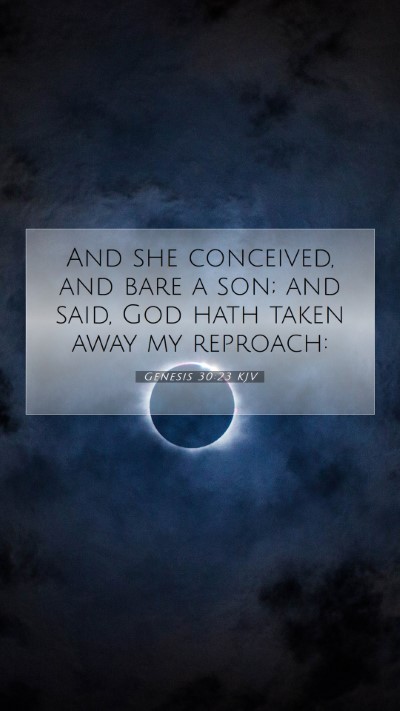Understanding Genesis 30:23
Bible Verse: Genesis 30:23 - "And she conceived, and bare a son; and said, God hath taken away my reproach."
Overview of the Verse
This verse captures the significant moment when Rachel gives birth to Joseph. The phrase "God hath taken away my reproach" indicates her relief and joy, reflecting her previous struggles with infertility. This narrative provides insight into the cultural and emotional context of motherhood and divine intervention in the Biblical era.
Insights from Commentaries
-
Matthew Henry:
Henry emphasizes that Rachel's conception and subsequent childbirth are acts of God’s mercy. He points out that Rachel attributes her son’s birth to divine intervention, which highlights her faith and the cultural weight placed on childbearing in her society. Henry notes the significance of "reproach" in this context, illustrating the societal pressure on women to bear children.
-
Albert Barnes:
Barnes provides an interpretation that focuses on the theological implications of Rachel's statement. He elaborates on the idea that God removing reproach symbolizes a broader theological narrative about God’s providence. Furthermore, he discusses how Rachel’s joy not only stems from the birth of Joseph but also points to the importance of divine favor and the fulfillment of promises made to the patriarchs.
-
Adam Clarke:
Clarke's analysis brings attention to the Hebrew wording and its deeper implications. He notes that Rachel's strong emotion reflects her previous despair and the cultural stigma associated with childlessness. Clarke also relates this moment to God’s covenant promises, indicating how this birth aligns with the broader narrative of the Israelite lineage and their covenant with God.
Thematic Insights
This verse encapsulates themes of divine intervention, cultural expectations, and the significance of motherhood. Rachel's experience resonates with many, illustrating how personal struggles can lead to profound spiritual revelations. Additionally, it serves as a reminder of God's involvement in human affairs and the blessings that follow faith and perseverance.
Application in Bible Study
When analyzing this verse for personal or group Bible study, consider the following:
- Discuss the emotional and spiritual journey of individuals facing infertility or other societal pressures.
- Explore the concept of God's faithfulness and how it is portrayed in the context of family and lineage.
- Reflect on the historical context of childbearing in ancient times compared to modern perspectives.
Cross References
- Genesis 29:31 - Rachel's struggle with her sister Leah's fertility.
- 1 Samuel 1:5-6 - The story of Hannah's barrenness and subsequent prayer.
- Luke 1:7 - Elizabeth's experience of being childless and God's intervention.
Conclusion
In summary, Genesis 30:23 provides rich insights into the themes of God's providence and the significance of childbearing within the cultural context of the era. Through the shared analysis of notable commentators, one can gain a deeper understanding of this scripture, making it a valuable topic for Bible study groups and personal reflection. By delving into the meaning of Bible verses like this, individuals can enhance their scriptural understanding and find inspiration in God's promises.
Further Study Recommendations
- Engage in online Bible study courses focusing on the lives of the patriarchs.
- Use Bible study tools to explore the genealogies presented throughout Genesis.
- Participate in discussions regarding the impact of cultural norms on faith practices.


